As I countersteered while the bright orange Toyota 4Runner TRD Pro slid sideways in the snow, the question of why anyone should buy one of these archaic SUVs kept rolling around my mind.
The answer is most people shouldn’t buy the Toyota 4Runner, and yet the Japanese automaker sold 121,023 units in the U.S. in 2022.
After spending a frigid winter week full of snow, ice, and cold in the 2023 Toyota 4Runner TRD Pro, I realized it’s essentially my Uncle Robert’s 1990 Nissan Pathfinder updated with safety equipment to pass muster as a “modern” SUV. It’s old, it hasn’t progressed, and the competition usually makes more sense, but it has an old school appeal. Here’s where it hits and misses.
2023 Toyota 4Runner TRD Pro
Pro: 4Runner TRD Pro features traditional brick-like SUV design
In an era when many crossover SUVs have cookie-cutter looks and limited visibility due to tiny windows, the 4Runner still looks like the rough-and-tumble SUV it is. With a blunt front end, lots of tall glass around the greenhouse, no rake to the roofline, and squared-off proportions, the 4Runner carries the traits of a traditional body-on-frame SUV. It’s one of the few two-row body-on-frame SUVs left. Others include the Jeep Wrangler and Ford Bronco. The 4Runner splits the difference between them and the softer, more curved unibody Grand Cherokee.
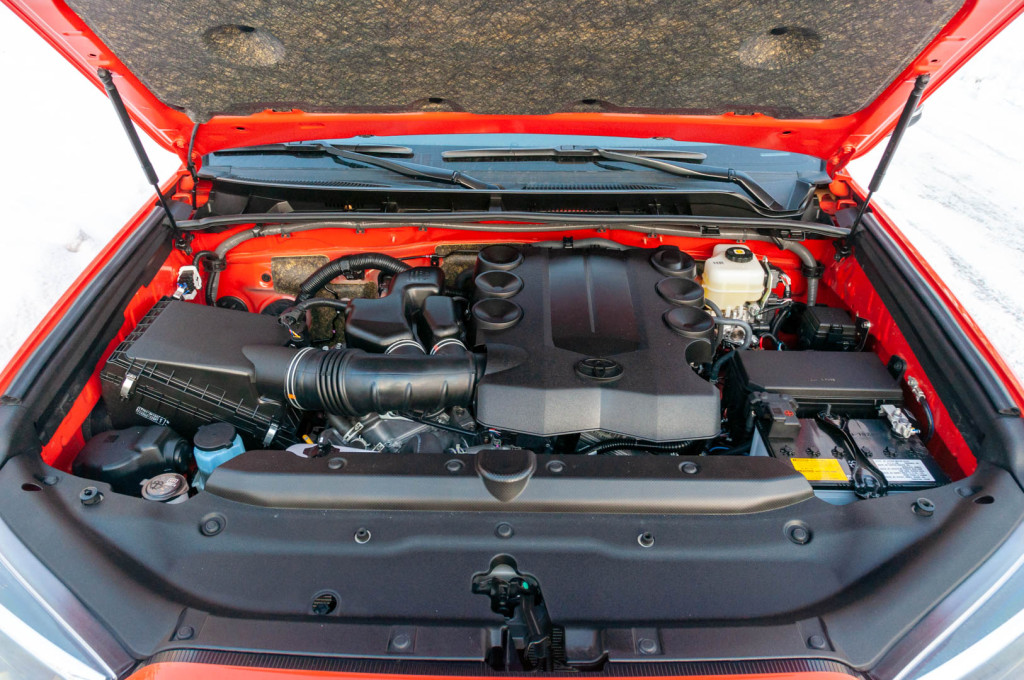
2023 Toyota 4Runner TRD Pro
Con: 4Runner TRD Pro has an archaic powertrain
The 4Runner’s powertrain is old and outgunned by the competition. While Broncos have 10-speed transmissions, and Grand Cherokees and Wranglers feature eight forward gears, the 4Runner’s 270-hp 4.0-liter V-6 makes do with just a 5-speed automatic transmission. It’s actually more like a 4-speed with an additional tall overdrive gear. It didn’t take long on a highway road trip for my wife to demand I turn off cruise control. To keep momentum at over 70 mph the transmission constantly dropped from fifth to fourth gear and then back again. It’s grating. This occurred regardless of whether I was driving alone or with the family and luggage.
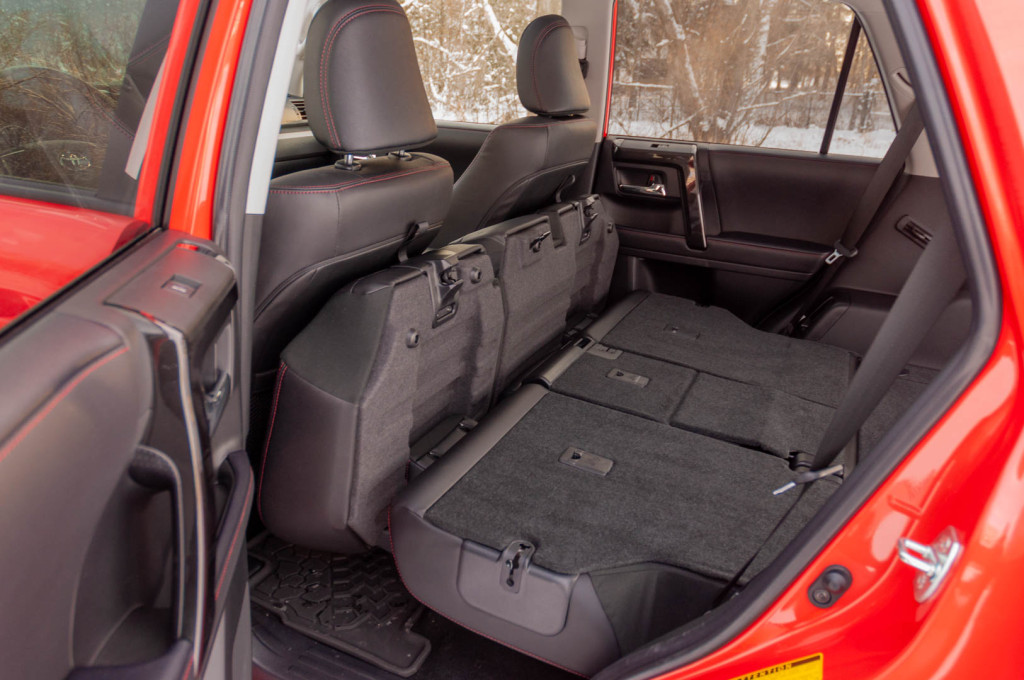
2023 Toyota 4Runner TRD Pro
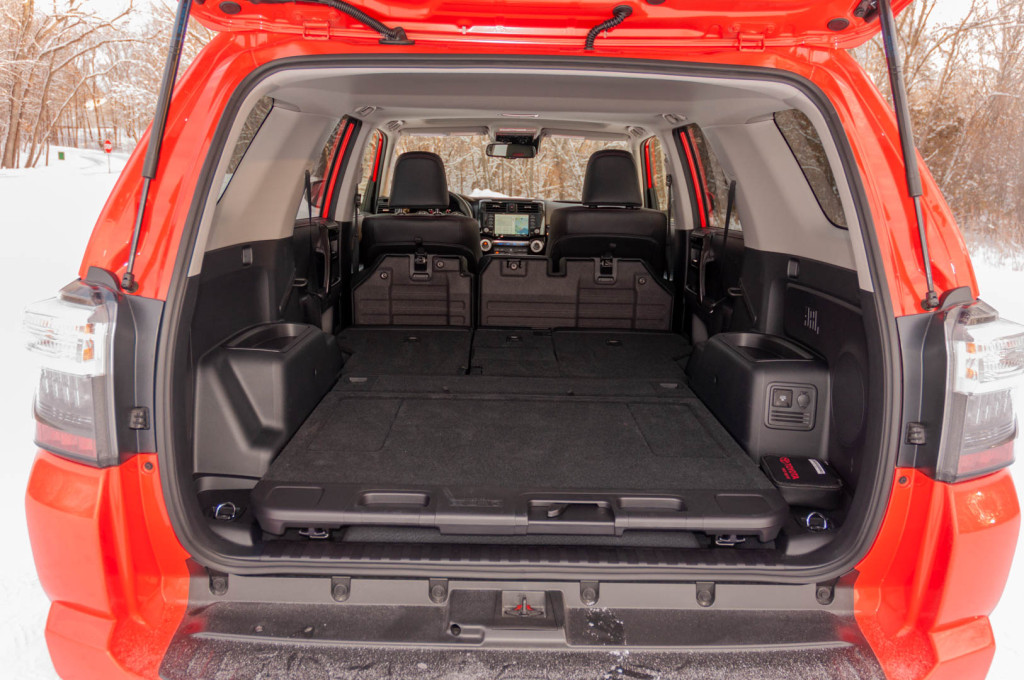
2023 Toyota 4Runner TRD Pro
Pro: 4Runner TRD Pro features true fold-flat second-row seat
Nearly every modern crossover SUV features a folding second-row seat, but many don’t fold entirely flat. The reason is because any bolstering on the seat backs makes them sit at an angle when they fold down onto the seat bottoms. Like my 2000 Grand Cherokee and Uncle’s 1990 Pathfinder, the 4Runner’s seat bottoms fold forward and then the seat backs tumble down. This creates a completely flat load floor. One fault with this setup is it limits how far back the front seat can slide when the rear seats are folded down, in part because the seat bottoms are fixed in place. Gentle giants like Senior Editor Bengt Halvorson, who is 6-foot-6, may be inconvenienced. At 5-foot-10, it works for me.
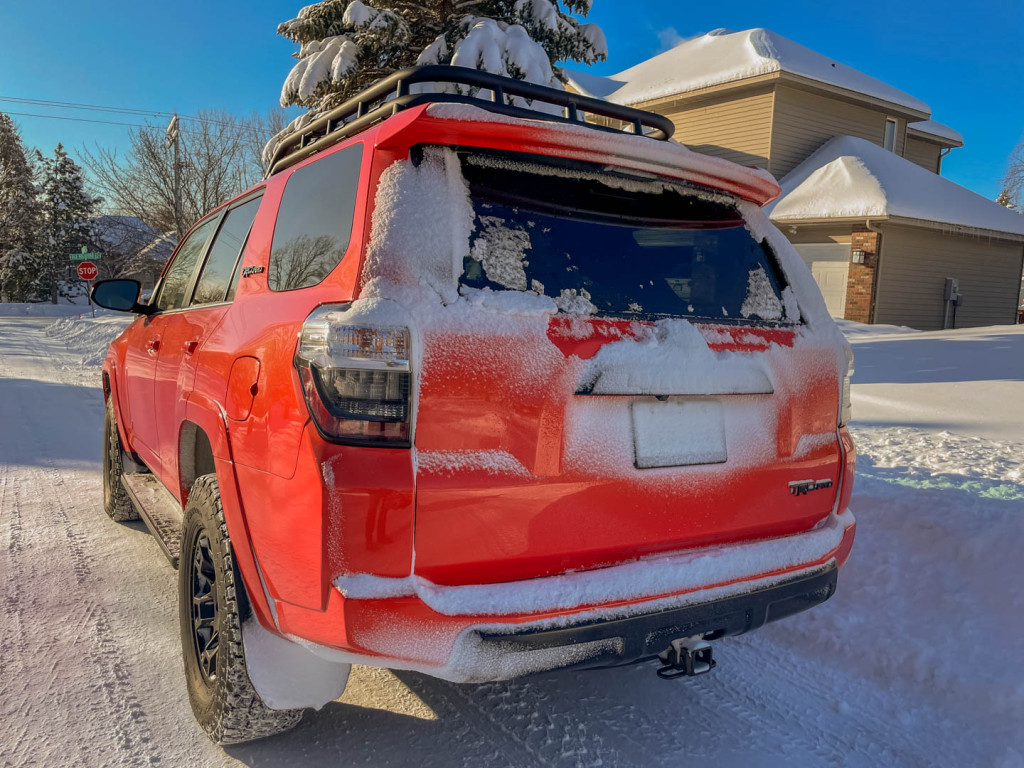
2023 Toyota 4Runner TRD Pro
Con: Poorly tuned ABS and ESC in 4Runner TRD Pro
Both the ABS and ESC are poorly tuned in the 4Runner for foul weather. The 4Runner will slide around a corner with far more angle than it probably should before the ESC will kick in and attempt to save your butt. That’s fun, but it’s not the safest tune for the average driver. The ABS also doesn’t react as quickly as in other vehicles I’ve driven in the snow, including my wife’s 2015 Grand Cherokee in the same weather on the same day. I adjusted my driving to be more careful on snow and ice. Will everyone?
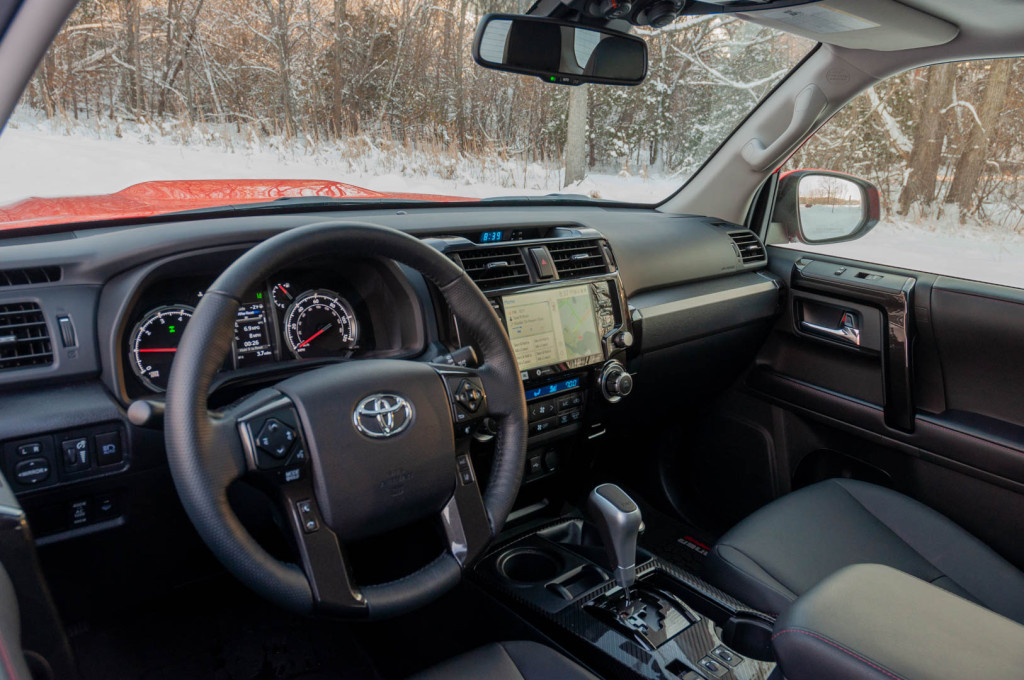
2023 Toyota 4Runner TRD Pro
Pro: 4Runner TRD Pro’s interior is from the ’90s
Feel modern cars are too complicated with too many features? The 4Runner might be for you. Aside from the 8.0-inch touchscreen, the 4Runner’s interior controls and ergonomics might as well be from the 1990s. The audio and climate functions are operated by oversized knobs and buttons. The analog gauge cluster is simple and uncluttered. The Bronco and Wrangler are similar, but they feature more modern infotainment systems. The Grand Cherokee has moved up market with a cleaner, more luxurious look while still retaining buttons and rocker switches.
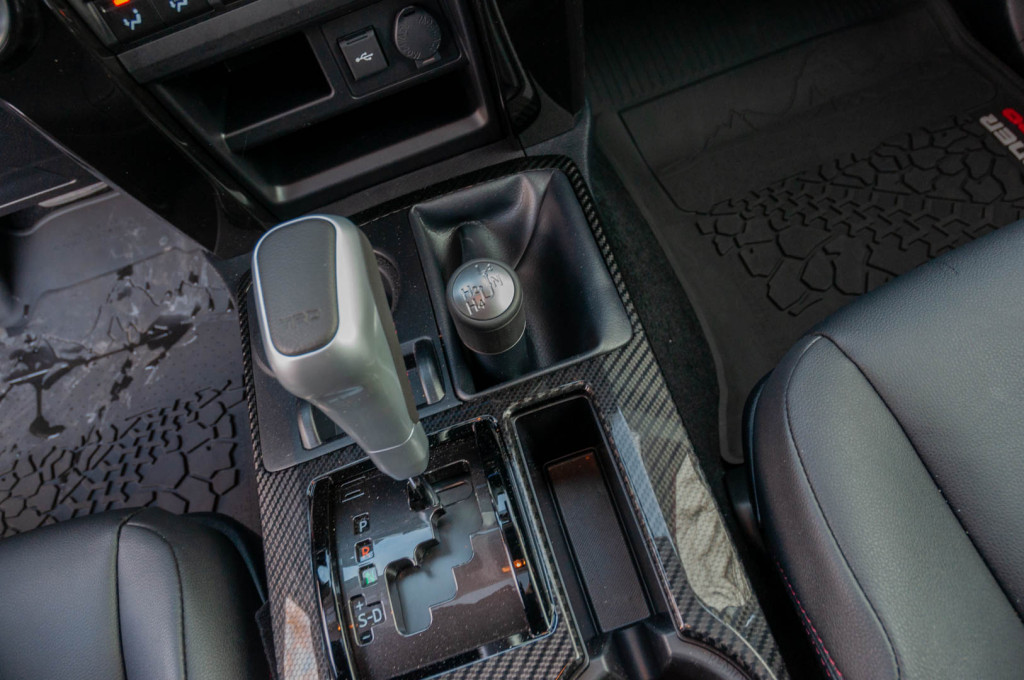
2023 Toyota 4Runner TRD Pro
Con: 4Runner TRD Pro has basic part-time four-wheel drive
The 4Runner TRD Pro, which is the most hardcore off-road oriented model in the lineup and the most expensive, costs $55,355. My tester’s options included extra-cost paint, running boards, a slide-out rear cargo tray, and a 50-state emissions package for $56,475. While that price includes four-wheel drive, it only works part time, and there’s no option for a full-time system. The system is engaged via a console-mounted stubby selector that also might be straight from the ’90s parts bin. In an odd twist, the only 4Runner model with full-time four-wheel drive is the less-expensive and chrome-laden Limited model. Low-rent Wranglers have part-time four-wheel drive, but upper trims and off-road-oriented models feature full-time systems. Every Bronco gets a full-time system, as does every Grand Cherokee equipped with four-wheel drive.
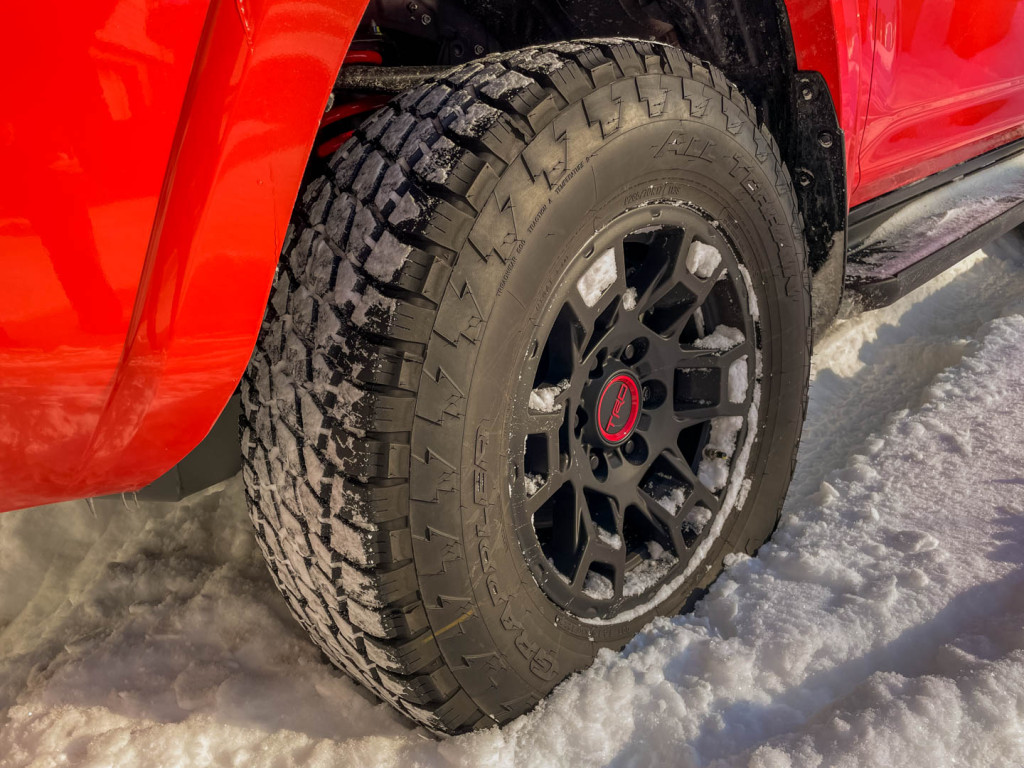
2023 Toyota 4Runner TRD Pro
Bonus: 4Runner TRD Pro’s off-road tires offer little traction in snowy climates
The Toyota 4Runner TRD Pro comes rolling on Nitto Grappler All Terrain tires. Despite how they may look, their big knobby treads are terrible in the snow and ice. The “3 Peak” rating many tire manufacturers slap on their tires to indicate they are snow-ready (including these Grappler ATs) doesn’t mean they are winter tires. A week with these Nittos made me thankful that my wife’s Grand Cherokee rides on Nokian Hakkapeliitta R3 winter tires. If you live in an area with harsh winters, invest in winter tires for your safety and the safety of others on the road. To boot, in the tire-rating system on Nitto’s own website, these Grappler AT tires rate a middling at best in every category except dry performance, in which they get a 4 out of 5.
The 4Runner is old and outdated. The Bronco, Wrangler, and Grand Cherokee run circles around it in most meaningful ways. All three are as capable, if not more so, off-road in the right configuration. All three have more modern powertrains and the Grand Cherokee is far more pleasant to drive.
Most people looking at a 4Runner should walk over to a Jeep or Ford showroom and plunk down money on a Wrangler, Grand Cherokee, or Bronco. But for the 121,023 people who didn’t in 2022, I sort of understand the decision.
The 4Runner speaks to me for the wrong reasons: It’s still quite capable and it’s from a lost time that can spur a tinge of nostalgia. Unc’s 1990 Nissan Pathfinder was rad. His was a blue-on-blue model with a manual transmission. Shame you can’t option any of that on a 4Runner.
––––––––––––––––––––––––––––––––––––––––––
2023 Toyota 4Runner TRD Pro
Base price: $55,355 including $1,335 destination
Price as tested: $56,475
Powertrain: 270-hp 4.0-liter V-6, 5-speed automatic transmission, part-time four-wheel drive
EPA fuel economy: 16/19/17 mpg
The hits: Great visibility, looks the part, easy-to-use controls, true fold-flat second row
The misses: Ancient powertrain, bad ABS and ESC tuning, part-time four-wheel drive, all-terrain tires aren’t winter tires
